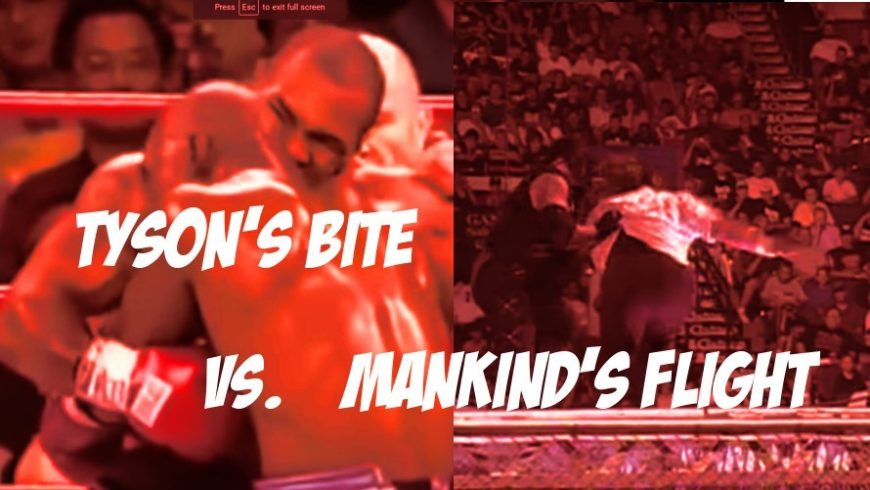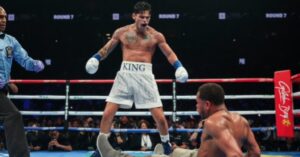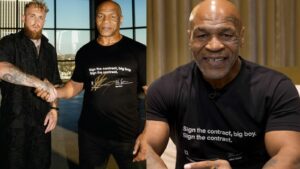June 28th is a day that shines in the pantheon of combat sports. Two magnificent moments happened on that day, separated by one mere rotation around the sun. Two sports that would have a profound influence on the sport of mixed martial arts. On June 28th, 1997, “Iron” Mike Tyson was disqualified from his rematch to champion Evander Holyfield. Tyson was disqualified for biting off his opponent’s ear. 1997 was a time when we were just cracking open our post-internet shell, peeking out into the new world of globalism, instant communication, and social media, and back then boxing ruled combat sports. That is unless you liked your combat, a little scripted.
In the world of pro wrestling, the Attitude Era was just starting. Vince McMahon announced on Raw that wrestling was fake and the entertainment side of the business was about to get a whole lot weirder. In June of ’98, during King of the Ring, the greatest moment of this newly emerging Attitude Era graced the PPV watching public. Mick Foley and the Undertaker opened their match with the ‘Taker throwing Mankind off the top of the Hell in a Cell. These two distinct moment in time, 19 and 20 years ago, seem immortal to some. Each event is a benchmark, a light post in our eventual path to modern combat sports. Which begs the question, which moment will endure longer? Which moment lingers longer in today’s combat sports? Who do we owe more to as MMA fans, boxers or wrestlers?
First, lets look at “Iron” Mike Tyson’s most infamous moment:
https://www.youtube.com/watch?v=Zmd0buwgqac
That fact this situation is the mainstream’s most distasteful memory of Mike Tyson is a testament to PR work, considering he was conviction for rape in 1992. But this moment enraged boxing fans. The honor of their fare sport had been violated. It didn’t help that Tyson had always been pegged as a thug, an unthinking bruiser without finesse, despite the abundance of evidence to the contrary. For some fans, this moment solidified everything that was wrong with Tyson, but his tarnish never sullied the sport of boxing itself. This video sums up that attitude post-Tyson Bite.
But for some casual fans, it increased the circus like atmosphere. It was bat shit crazy. It was weird. And it was the best thing that happened in a boxing ring that year. For the mainstream, interest in the boxing centered around “Iron” Mike. And this was his swan song. Sure, there would be other fights, even another hyped up PPV, but nothing with as much profile. This was the last fight where the myth of Tyson was still alive. This was our goodbye to his bizarre career of, and it helped cement the legend that was to come.
Now, Mike Tyson is a pop culture figure, a cartoon character, a Broadway performer, and against all odds, an American hero. And somehow, I can’t help but think that Tyson’s Bite played a hand in creating it all. When he bit Holyfield, people decided this was a man not in control of himself. A victim. Forgiving him for biting Holyfield, forgave him of his more serious crimes. A bit of cultural magic had turned Mike Tyson, once the world’s scariest man, into a sympathetic figure.
Exactly one year later, a different sort of magic occurred in a different sort of ring. When WWE wrestler Mick Foley (AKA Mankind, AKA Dude Love, AKA Cactus Jack) suggested to his opponent The Undertaker that they throw Foley off the cage, ‘Taker asked Foley if he “wanted to die”. He could never recalled how Mick Foley answered.
The moment left a lasting legacy in wrestling. Soon every event needed to ratchet up the intensity of spots like this. A whole new generation of wrestlers would spend their careers trying to top these insane moments, and wrestling more dangerous than ever. Or at least relatively more dangerous. Did this have the immediate impact as Tyson biting a chunk out of Holyfield? Hard to tell. Tyson’s Bite made the evening news. It seemed global. But if you were to ask any Millennial male to name any moment of wrestling they remember, i’d bet a sizable portion would recall this. It’s also emblematic of that what was sold to children of that generation. It was the start of a trend that would continue into the 2000s, selling the extreme. Mick Foley’s fall from the cage tapped into the zeitgeist. It highlighted the enlightened nihilism of being young in the late 1990s. The willingness to lay it all on the line, even your life, not for glory, but because life could only be experienced in these extremes. That’s why ecstasy was popular.
But which of our two moment lasts? Which matters in a modern world of Rizin, and The Ultimate Fighter, and Conor fighting Floyd fucking Mayweather? In a world were there is subreddits reviewing wrestling pornography, how can these moments even matter? Maybe, they don’t. Maybe the hyper-drive pace of technology makes the past irrelevant at an exponentially increasing rate. So things that happened twenty years ago are as irrelevant today as things the happened 500 years ago in the 1970s. Or maybe that’s some dumb bullshit. What if moments like these touch our culture every day? Every time two boxers head fight a bit too long in the clinch, and we call for the ref to separate, every time a wrestler ascends a ladder, and our collective anxiety or joy raises, these are all a small homage to our memories of the past. They legacy is tied to the continued existence of the sport itself. Just maybe all these moments that brought us here are equally important.
Post-script: For the sake of narrative symmetry, here’s Mick Foley’s story of how he lost his ear.
Post-post-script: Mankind being thrown off the cage by ‘Taker is actually the better moment.








